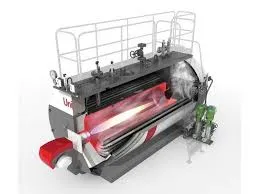
9월 . 25, 2024 16:02 Back to list
hot water boiler heat exchanger
Hot Water Boiler Heat Exchanger An Overview
In modern heating systems, the efficiency and effectiveness of hot water delivery are critical for both residential and commercial applications. Central to this process is the hot water boiler heat exchanger, which plays a pivotal role in transferring heat from one medium to another, maintaining optimal temperatures, and ensuring energy efficiency. Understanding how these devices function and their importance can help users make informed decisions regarding heating systems.
What is a Heat Exchanger?
A heat exchanger is a system designed to transfer heat between two or more fluids without mixing them. In the context of a hot water boiler, the primary fluids involved are water and a heat source, usually burning fuel or electric heating elements. The heat exchanger facilitates the transfer of thermal energy from the heat source to the water, providing hot water for various applications.
Types of Heat Exchangers
There are several types of heat exchangers used in hot water boilers, including
1. Shell and Tube Heat Exchangers These consist of a series of tubes, one set carrying the hot fluid and the other carrying the cold fluid. This design allows for a large surface area for heat transfer, making it suitable for high-capacity systems.
2. Plate Heat Exchangers Made up of numerous thin plates stacked together, these exchangers provide a compact design and high efficiency, as the large surface area facilitates better heat transfer. They are widely used in residential applications due to their efficiency and relatively low cost.
3. Spiral Heat Exchangers These consist of two spiral channels; one for hot fluid and another for cold fluid. This design minimizes pressure drop and can handle fluids with a high viscosity, making them ideal for specific industrial processes.
4. Air-cooled Heat Exchangers These utilize ambient air to cool or heat a fluid, applicable in situations where water sources are scarce. They are more commonly found in larger industrial applications.
The Working Principle
hot water boiler heat exchanger

In a hot water boiler heat exchanger, the heat is transferred from the combustion gases or electric heating elements to water through conduction. For instance, as fuel burns within the boiler, hot gases circulate around the heat exchanger, transferring heat to the metal surfaces. The water flowing in pipes adjacent to these surfaces absorbs the heat and is subsequently heated.
The efficiency of this heat transfer process is essential. The more efficient the heat exchanger, the less energy is wasted, which translates to lower heating costs. Maintaining a clean heat exchanger is also crucial, as scale and deposits can significantly reduce efficiency by creating a barrier between the hot surface and the water.
Importance of Hot Water Boiler Heat Exchangers
The hot water boiler heat exchanger is vital for several reasons
1. Energy Efficiency An efficient heat exchanger enhances the overall performance of the boiler system, leading to reduced energy consumption and lower utility bills.
2. Consistent Hot Water Supply A properly functioning heat exchanger ensures that hot water is available on demand, which is critical for residential and commercial applications.
3. System Longevity With efficient heat transfer and proper maintenance, the lifespan of heating systems can be extended, reducing the need for frequent replacements and repairs.
4. Environmental Impact More efficient systems contribute to lower greenhouse gas emissions, aligning with global efforts towards energy conservation and climate change mitigation.
Conclusion
The hot water boiler heat exchanger is an essential component in heating systems, directly affecting energy efficiency, user comfort, and system reliability. By understanding its types, functioning, and importance, homeowners and facility managers can make better decisions regarding their heating systems. Investing in high-quality heat exchangers and ensuring regular maintenance can lead to significant benefits, including reduced energy costs and improved environmental impact. As technology continues to advance, we can expect even more efficient solutions in the area of heat exchange, paving the way for a more sustainable future.
-
Best Steam Boiler Design PDF Free Design Calculation & Diagram Downloads
NewsJun.10,2025
-
Hot Boiler Water Heater Efficient Heating Solutions for Home & Commercial Use
NewsJun.10,2025
-
Steam Boiler Safety Devices High-Quality Protection Valves
NewsJun.10,2025
-
Ultimate Steam Boiler Checklist for Safety & Efficiency
NewsJun.10,2025
-
Optimal Hot Water Boiler Temperature Setting Guide
NewsJun.10,2025
-
Effective Hot Water Boiler Chemical Treatment Protect & Maintain
NewsJun.09,2025
Related PRODUCTS






















